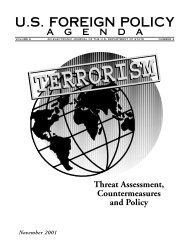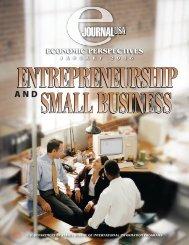s. history us history us history - Embassy of the United States
s. history us history us history - Embassy of the United States
s. history us history us history - Embassy of the United States
- No tags were found...
Create successful ePaper yourself
Turn your PDF publications into a flip-book with our unique Google optimized e-Paper software.
CHAPTER 12: POSTWAR AMERICAOUTLINE OF U.S. HISTORYthreatened to occupy <strong>the</strong> entirepeninsula. In November, Chinaentered <strong>the</strong> war, sending massiveforces across <strong>the</strong> Yalu River. U.N.forces, largely American, retreatedonce again in bitter fighting. Commandedby General Mat<strong>the</strong>w B.Ridgway, <strong>the</strong>y stopped <strong>the</strong> overextendedChinese, and slowly fought<strong>the</strong>ir way back to <strong>the</strong> 38th parallel.MacArthur meanwhile challengedTruman’s authority by attemptingto orchestrate public support forbombing China and assisting aninvasion <strong>of</strong> <strong>the</strong> mainland by ChiangKai-shek’s forces. In April 1951, Trumanrelieved him <strong>of</strong> his duties andreplaced him with Ridgway.The Cold War stakes were high.Mindful <strong>of</strong> <strong>the</strong> European priority,<strong>the</strong> U.S. government decided againstsending more troops to Korea andwas ready to settle for <strong>the</strong> prewarstat<strong>us</strong> quo. The result was fr<strong>us</strong>trationamong many Americans whocould not understand <strong>the</strong> needfor restraint. Truman’s popularityplunged to a 24-percent approvalrating, <strong>the</strong> lowest to that time <strong>of</strong> anypresident since pollsters had begunto measure presidential popularity.Truce talks began in July 1951. Thetwo sides finally reached an agreementin July 1953, during <strong>the</strong> firstterm <strong>of</strong> Truman’s successor, DwightEisenhower.Cold War struggles also occurredin <strong>the</strong> Middle East. The region’s strategicimportance as a supplier <strong>of</strong> oilhad provided much <strong>of</strong> <strong>the</strong> impet<strong>us</strong>for p<strong>us</strong>hing <strong>the</strong> Soviets out <strong>of</strong> Iran in1946. But two years later, <strong>the</strong> <strong>United</strong><strong>States</strong> <strong>of</strong>ficially recognized <strong>the</strong> newstate <strong>of</strong> Israel 15 minutes after it wasproclaimed — a decision Trumanmade over strong resistance fromMarshall and <strong>the</strong> State Department.The result was an enduring dilemma— how to maintain ties with Israelwhile keeping good relations withbitterly anti-Israeli (and oil-rich)Arab states.EISENHOWER AND THECOLD WARIn 1953, Dwight D. Eisenhower became<strong>the</strong> first Republican presidentin 20 years. A war hero ra<strong>the</strong>r thana career politician, he had a natural,common touch that made himwidely popular. “I like Ike” was <strong>the</strong>campaign slogan <strong>of</strong> <strong>the</strong> time. Afterserving as Supreme Commander<strong>of</strong> Allied Forces in Western Europeduring World War II, Eisenhowerhad been army chief <strong>of</strong> staff,president <strong>of</strong> Columbia University,and military head <strong>of</strong> NATO beforeseeking <strong>the</strong> Republican presidentialnomination. Skillful at getting peopleto work toge<strong>the</strong>r, he functionedas a strong public spokesman andan executive manager somewhat removedfrom detailed policy making.Despite disagreements on detail,he shared Truman’s basic view <strong>of</strong>American foreign policy. He, too,perceived Communism as a monolithicforce struggling for world supremacy.In his first inaugural address,he declared, “Forces <strong>of</strong> goodand evil are massed and armed andopposed as rarely before in <strong>history</strong>.Freedom is pitted against slavery,lightness against dark.”The new president and his secretary<strong>of</strong> state, John Foster Dulles, hadargued that containment did not g<strong>of</strong>ar enough to stop Soviet expansion.Ra<strong>the</strong>r, a more aggressive policy<strong>of</strong> liberation was necessary, to freethose subjugated by Communism.But when a democratic rebellionbroke out in Hungary in 1956, <strong>the</strong><strong>United</strong> <strong>States</strong> stood back as Sovietforces suppressed it.Eisenhower’s basic commitmentto contain Communism remained,and to that end he increased Americanreliance on a nuclear shield. The<strong>United</strong> <strong>States</strong> had created <strong>the</strong> firstatomic bombs. In 1950 Truman hadauthorized <strong>the</strong> development <strong>of</strong> a newand more powerful hydrogen bomb.Eisenhower, fearful that defensespending was out <strong>of</strong> control, reversedTruman’s NSC-68 policy <strong>of</strong> alarge conventional military buildup.Relying on what Dulles called “massiveretaliation,” <strong>the</strong> administrationsignaled it would <strong>us</strong>e nuclear weaponsif <strong>the</strong> nation or its vital interestswere attacked.In practice, however, <strong>the</strong> nuclearoption could be <strong>us</strong>ed only againstextremely critical attacks. RealCommunist threats were generallyperipheral. Eisenhower rejected <strong>the</strong><strong>us</strong>e <strong>of</strong> nuclear weapons in Indochina,when <strong>the</strong> French were o<strong>us</strong>tedby Vietnamese Communist forcesin 1954. In 1956, British and Frenchforces attacked Egypt followingEgyptian nationalization <strong>of</strong> <strong>the</strong> SuezCanal and Israel invaded <strong>the</strong> EgyptianSinai. The president exertedheavy pressure on all three countriesto withdraw. Still, <strong>the</strong> nuclear threatmay have been taken serio<strong>us</strong>ly byCommunist China, which refrainednot only from attacking Taiwan, butfrom occupying small islands heldby Nationalist Chinese j<strong>us</strong>t <strong>of</strong>f <strong>the</strong>mainland. It may also have deterredSoviet occupation <strong>of</strong> Berlin, whichreemerged as a festering problemduring Eisenhower’s last two yearsin <strong>of</strong>fice.THE COLD WAR AT HOMENot only did <strong>the</strong> Cold War shapeU.S. foreign policy, it also had a pr<strong>of</strong>oundeffect on domestic affairs.Americans had long feared radicalsubversion. These fears could attimes be overdrawn, and <strong>us</strong>ed to j<strong>us</strong>tifyo<strong>the</strong>rwise unacceptable politicalrestrictions, but it also was true thatindividuals under Communist Partydiscipline and many “fellow traveler”hangers-on gave <strong>the</strong>ir politicalallegiance not to <strong>the</strong> <strong>United</strong> <strong>States</strong>,but to <strong>the</strong> international Communistmovement, or, practically speaking,to Moscow. During <strong>the</strong> Red Scare<strong>of</strong> 1919-1920, <strong>the</strong> government hadattempted to remove perceivedthreats to American society. AfterWorld War II, it made strong effortsagainst Communism within <strong>the</strong><strong>United</strong> <strong>States</strong>. Foreign events, espionagescandals, and politics createdan anti-Communist hysteria.When Republicans were victorio<strong>us</strong>in <strong>the</strong> midterm congressionalelections <strong>of</strong> 1946 and appeared264265












